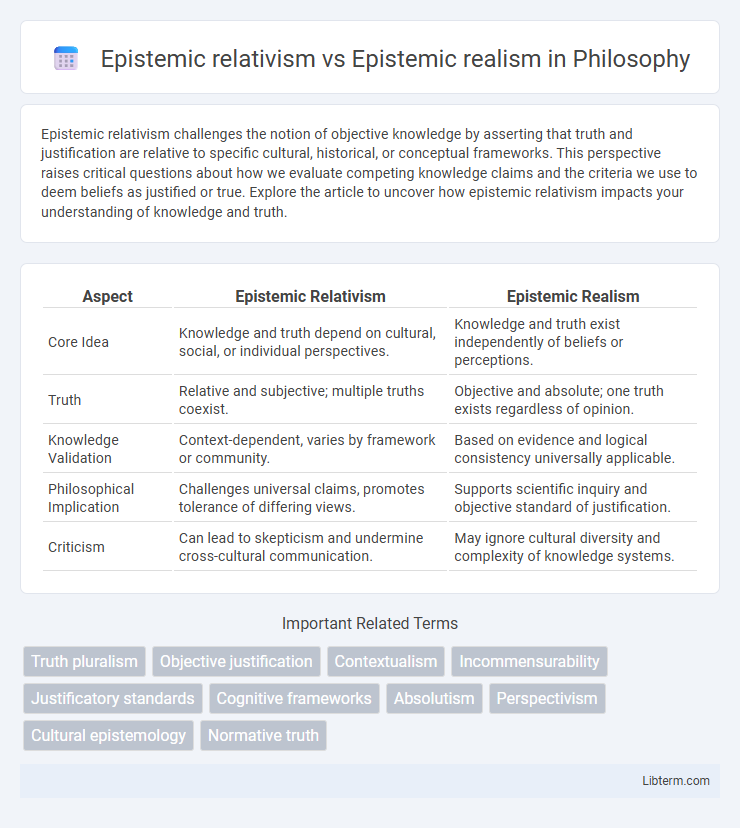Epistemic relativism challenges the notion of objective knowledge by asserting that truth and justification are relative to specific cultural, historical, or conceptual frameworks. This perspective raises critical questions about how we evaluate competing knowledge claims and the criteria we use to deem beliefs as justified or true. Explore the article to uncover how epistemic relativism impacts your understanding of knowledge and truth.
Table of Comparison
| Aspect | Epistemic Relativism | Epistemic Realism |
|---|---|---|
| Core Idea | Knowledge and truth depend on cultural, social, or individual perspectives. | Knowledge and truth exist independently of beliefs or perceptions. |
| Truth | Relative and subjective; multiple truths coexist. | Objective and absolute; one truth exists regardless of opinion. |
| Knowledge Validation | Context-dependent, varies by framework or community. | Based on evidence and logical consistency universally applicable. |
| Philosophical Implication | Challenges universal claims, promotes tolerance of differing views. | Supports scientific inquiry and objective standard of justification. |
| Criticism | Can lead to skepticism and undermine cross-cultural communication. | May ignore cultural diversity and complexity of knowledge systems. |
Introduction to Epistemic Relativism and Epistemic Realism
Epistemic relativism asserts that knowledge and truth are contingent upon cultural, historical, or individual perspectives, denying absolute or universal epistemic standards. Epistemic realism maintains that objective knowledge exists independently of human beliefs or frameworks, positing that truths correspond to an external reality. The debate centers on whether epistemic justification is universally valid or contextually dependent, influencing philosophical discussions on truth, knowledge, and belief systems.
Defining Epistemic Relativism
Epistemic relativism asserts that knowledge and truth are not absolute but depend on cultural, historical, or individual perspectives, meaning that what counts as knowledge varies across different epistemic frameworks. This contrasts with epistemic realism, which holds that there are objective truths and facts independent of human beliefs or social contexts. Epistemic relativism challenges the notion of universal epistemic standards by emphasizing the contingent and context-dependent nature of knowledge claims.
Principles of Epistemic Realism
Epistemic Realism is grounded in the principle that knowledge corresponds to an objective reality independent of individual beliefs or cultural perspectives. It maintains that truth is discoverable through empirical evidence, logical reasoning, and scientific methods, ensuring that knowledge claims can be objectively verified. This framework opposes Epistemic Relativism, which asserts that truth and knowledge are contingent on social, cultural, or individual contexts, denying universal epistemic standards.
Historical Context: Roots of the Debate
Epistemic relativism traces its roots to ancient Greek skepticism, particularly Pyrrho and Sextus Empiricus, who questioned the possibility of certain knowledge. Epistemic realism emerged prominently during the Scientific Revolution, with thinkers like Galileo and Descartes asserting the existence of objective, mind-independent truths. The historical debate reflects contrasting views on whether knowledge is culturally or historically contingent versus universally valid and discoverable through empirical inquiry.
Core Arguments for Epistemic Relativism
Epistemic relativism argues that knowledge and truth are dependent on cultural, historical, or individual perspectives, denying a single objective standard for justification. Core arguments emphasize the variability of epistemic standards across different communities, suggesting that what counts as knowledge is contingent upon specific social or conceptual frameworks. This challenges epistemic realism's claim of universal, context-independent truths by highlighting the influence of human practices and cognitive diversity on epistemic justification.
Key Claims of Epistemic Realism
Epistemic realism asserts that knowledge corresponds to objective reality independent of human beliefs or perceptions, emphasizing that there are true answers to epistemic questions regardless of cultural or individual viewpoints. It claims that evidence and rational justification can reliably lead to accurate knowledge about the external world. This position contrasts with epistemic relativism, which holds that truth and justification vary based on different epistemic frameworks or contexts.
Major Philosophers and Theoretical Influences
Epistemic relativism finds strong advocacy in philosophers like Thomas Kuhn and Paul Feyerabend, who emphasize the influence of historical and cultural contexts on knowledge frameworks, challenging the idea of universal truth. Epistemic realism, championed by figures such as Hilary Putnam and Richard Boyd, argues for objective standards and correspondence theories of truth grounded in a mind-independent reality. The development of epistemic relativism is deeply influenced by postmodernist critiques and the sociology of scientific knowledge, whereas epistemic realism draws from classical empiricism and scientific realism traditions.
Implications for Knowledge and Truth
Epistemic relativism denies absolute knowledge and truth, asserting these concepts depend on cultural, historical, or conceptual frameworks, which challenges the universality of scientific principles and moral judgments. Epistemic realism upholds the existence of objective knowledge and truth independent of belief systems, supporting consistent scientific inquiry and stable ethical standards. This fundamental divergence influences debates in philosophy of science, ethics, and cross-cultural understanding, affecting how knowledge claims are validated and truths are established.
Criticisms and Counterarguments
Epistemic relativism faces criticism for its potential to undermine objective knowledge by suggesting truth varies based on cultural or individual perspectives, leading to accusations of epistemic nihilism. Critics argue epistemic realism offers a more robust framework by positing that truths about reality exist independently of beliefs, allowing for objective verification and falsification. Counterarguments to realism highlight the challenges of accessing an unbiased reality, emphasizing the influence of social, historical, and linguistic contexts on knowledge claims.
Conclusion: Bridging the Epistemic Divide
Epistemic relativism and epistemic realism represent opposing views on the nature of knowledge, with relativism emphasizing the contextual and cultural dependence of truth, while realism upholds an objective, independent reality. Bridging the epistemic divide requires acknowledging the validity of diverse perspectives without abandoning the pursuit of universal truths. Integrative approaches in philosophy and cognitive science offer pathways to reconcile these positions, fostering a more nuanced understanding of knowledge that respects both relativistic insights and realist commitments.
Epistemic relativism Infographic

 libterm.com
libterm.com